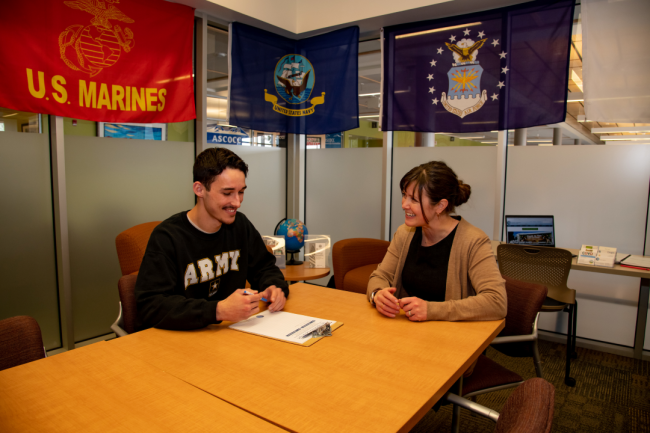You have /5 articles left.
Sign up for a free account or log in.

With Department of Education grant funding, COCC will expand its physical footprint for student veterans and hire additional support staff.
Central Oregon Community College
For veterans, enrolling in higher education can be an important turning point in establishing their life as a civilian. Despite the opportunities present, retention and completion among student veterans remains low.
In the 2015-16 academic year, around 5 percent of all undergraduates nationally were veterans. Compared to their peers, veteran students are twice as likely to attend a for-profit institution and slightly more likely to attend a public two-year institution, according to data from the National Postsecondary Student Aid Survey (NPSAS).
However, veteran students have been historically less likely to complete their certificate or degree. Of the 2011-12 cohort, only 16.9 percent earned a bachelor’s degree by 2017, and 52 percent of veteran students had not attained a degree or certificate, according to the Baccalaureate & Beyond survey.
To promote veteran student success, the Department of Education awarded Central Oregon Community College (COCC) a three-year grant totaling $600,000 to enhance support services and establish a center.
8 Keys to Veterans’ Success
A 2012 executive order from the Obama administration called upon agencies to work together to ensure institutions effectively serve former service members. The Departments of Veterans Affairs, Education and Defense established the 8 Keys to Veterans’ Success to aid veterans in their educational goals.
The keys include: creating a culture of trust, creating sustained support, establishing an early alert system, coordinating campus efforts, collaborating with local organizations, using data, educating faculty and staff members on veterans’ issues and developing sustainable systems.
Since 2012, 2,000 colleges and universities have formally committed to being an 8 Keys to Veterans’ Success Site.
The new Center of Excellence for Veteran Student Success will remodel an existing space on the Bend campus to unify veterans’ resources and staff to promote retention and persistence among those using veterans’ resources.
What’s the need: Of COCC’s students, around 400 (9 percent) use veterans’ benefits—making them a veteran or a veteran’s spouse or dependent.
As veterans, COCC’s students face unique life circumstances as they transition into higher education, Davis explains.
For one, veterans are used to the rigid structure of the military, which dictates when they work, where they live and the hierarchy of command in their lives. Starting at the college means navigating a plethora of options, which can be overwhelming.
“One of the great things about higher ed is we tell people, ‘Do whatever you want! The world’s your oyster, go pick!’” Davis says. “A lot of our students have gotten so acclimated to the military lifestyle that that, just alone, out of the gate is a challenge.”
Other challenges for veterans include building community with their peers and setting goals for their education. Sometimes veterans are learning to live with post-traumatic stress disorder or other mental illnesses, as well.
By establishing a central student success location, the COCC staff hopes to create a space for student veterans to find the answers to their questions and be connected to resources as needed.
The center: The Center of Excellence for Veteran Student Success will unify all of COCC’s existing supports for student veterans as well as expand opportunities for engagement and connection.
At present, COCC has a lounge where student veterans can study, relax or interact with their peers. Staff members who provide student veteran support are located on the other side of campus, Davis says.
“What we envision is expanding that scope fairly significantly, so that we’ve got our staff person on site where they’re really easily accessible to the students,” he adds.
The new center will also feature a multimedia classroom to be used as a hybrid meeting space to connect veterans across COCC’s campuses remotely.
The college is still in the early stages of planning the center, so there aren’t any firm design plans established yet. However, it is important to administrators that veterans’ voices are incorporated into that stage, Davis says. “We know that our best source of information for what’s going to make a student veteran feel included is the student.”
Expanded services: The grant funding begins Oct. 1, and renovation for the center will take place in the first 12 to 18 months.
The first step in the process will be increasing the hours of COCC’s part-time program coordinator and adding a part-time veterans’ outreach position, Davis says.
Additionally, COCC administrators will allocate grant funding to establish community partnerships to provide counseling and support services like housing for its veteran community.
“It’s really going to help us not just to have a physical space that will help us serve our veterans and hopefully ensure their success while they’re here, but providing a lot of those wraparound resources that we know can be so critical to making sure that, when they get here, that they get through our system successfully,” Davis says.
If your student success program has a unique feature or twist, we’d like to know about it. Click here to submit.




